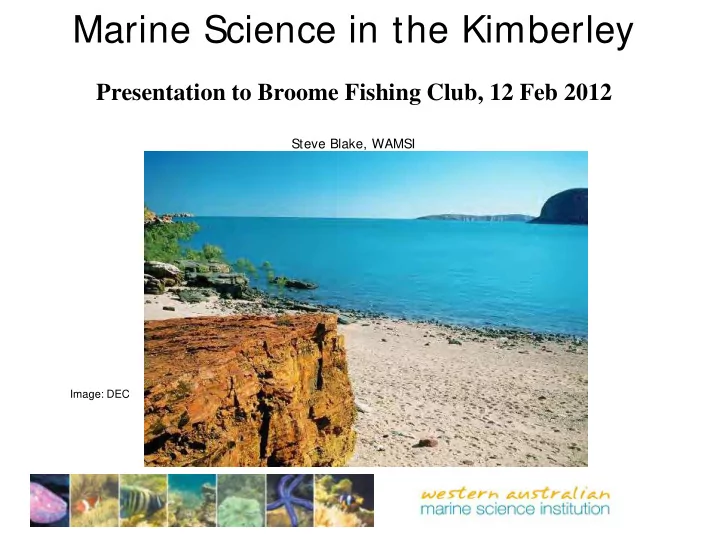

Marine Science in the Kimberley Presentation to Broome Fishing Club, 12 Feb 2012 Steve Blake, WAMSI Image: DEC
Talk Outline • WA marine & coastal context; • The Kimberley coast & offshore region; • What’s next [2012 – 2017]?
The Leeuwin Current eddy pair seaward of the Leeuwin Current (2003) Image: CSIRO
Image: WA Fisheries
KIMBERLEY MARINE SCIENCE
Kimberley Browse Region Image: Landgate
Kimberley Browse Marine Region • High velocity tidal currents [< 2m/sec]; • Extensive mixing; • Localised high productivity cells; • High ranges of water temps & turbidity levels; • Rich benthic communities: corals, algae, sponges
Image courtesy of Geoscience Australia
Image: IMCRA
Image: Stuart, 1923
Image: AIMS
• MONTGOMERY REEF (FROM GOOGLE EARTH)
Image: B. Wilson
Image: B. Wilson
Image: B. Wilson
Image: DEC
Image: DEC
Example Tri-color scanner data at 2m pixel resolution with NDVI vegetation class/type enhancement in tidal mudflat area, Kimberley region, WA
IMOS Kimberley Mooring Array • The Kimberley (KIM) array was deployed on RV Solander between Jan 28 & Feb 5, 2012 • 4 moorings located at 400m and 200m depth on the shelf break and 100m and 56m • Coastal mooring at 54m depth (LAT) Slide: IMOS
Monitoring of Humpback Whales in Pender Bay Community-based monitoring of Humpback Whales in a very remote place
Figure 3 . Cliff top survey location at 16 45.939S 122 36.546E at 30m above MSL at Pender Bay. Caravan on cliff top is located behind concrete pad survey point.
Mean number of whales normalised for viewing effort in 2009, 2010 & 2011
Mean number of whales per month, normalised per viewing effort from the combined 2009, 2010 & 2011 surveys
Mean number of whales normalised per viewing effort [black] and the mean percentage of calves [green] compared against the Day of the Year in 2009 and 2010 combined
P+ 08 9192 4999 E: research@cygnetbaypearls.com.au www.kmrs.com.au
WAMSI 2 Kimberley Marine Research Program
Kimberly Marine Research Program (KMRP) • Awarded $12M State Government funding over 6 years • Collaboration with 16 partners - State, Federal, industry & academic bodies
KMRP Outcomes • Plan & manage Kimberley marine park network; • Identify & manage human impacts & potential risks; • Understand, adapt to and mitigate climate change impacts; • Better understand impacts tourism, recreational & commercial activities; • Further include indigenous knowledge & participation in marine management
KMRP Science Plan Developing a regional perspective across two major research areas: • Bio-physical and social characterisation – foundational information • Understanding key ecosystem processes – ecosystem function & response to human impacts
For further information: KMRP Strategy and Science Plan available at www.wamsi.org.au Contact: Chris Simpson Node Leader, KMRP Marine Science Program, DEC chris.simpson@dec.wa.gov.au Kelly Waples Science Coordinator, KMRP Marine Science Program, DEC kelly.waples@dec.wa.gov.au
Thanks to all those people - the Aboriginal Traditional Owners, the scientists, the local people & tourism operators of the Kimberley, who have offered their support, facilities and knowledge in a shared bid and belief to establish a truly independent Regional Marine Science Program for the Kimberley
Recommend
More recommend